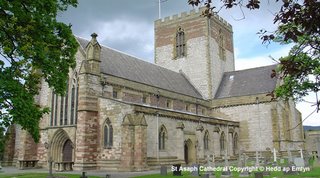The 'St. Asaph Policy': Welsh Disestablishment 7
 The 1890s saw Welsh Disestablishment move into its final and most divisive phase. The appointment of Alfred George Edwards to St. Asaph by Lord Salisbury in 1889, chiefly on the grounds of his work in attacking Nonconformist pretensions, saw one of the North Wales sees placed in the hands of a skillful ecclesiastical politician. Bishop Edwards, formerly the Warden (Headmaster) of Llandovery College, gathered around him a group of similarly-minded men, including John Owen, his successor as Warden at Llandovery College, who soon became Dean of St. Asaph, and would later be appointed to St. David's, the largest Welsh Diocese.
The 1890s saw Welsh Disestablishment move into its final and most divisive phase. The appointment of Alfred George Edwards to St. Asaph by Lord Salisbury in 1889, chiefly on the grounds of his work in attacking Nonconformist pretensions, saw one of the North Wales sees placed in the hands of a skillful ecclesiastical politician. Bishop Edwards, formerly the Warden (Headmaster) of Llandovery College, gathered around him a group of similarly-minded men, including John Owen, his successor as Warden at Llandovery College, who soon became Dean of St. Asaph, and would later be appointed to St. David's, the largest Welsh Diocese.Unlike his brother, Dean Edwards of Bangor, whose suicide in 1884 after a lengthy battle with depression, robbed Wales of a man of truly heroic stature, Alfred George Edwards did not believe in conciliating Nonconformity. He attacked the numerical statistics given by Nonconformists, as well as challenging other alleged facts. However, in this action, Edwards was known to step over the bounds of Christian charity, as well as appearing to attack the Welsh language itself. For example, while his call for a religious census to establish the exact position of the Church in Wales vis-a-vis Nonconformity was not in itslf unfair, when coupled with remarks on the language census that appeared to belittle the Welsh language, it appeared to be an attack on Wales itself. Similarly, some of his statements on Nonconformity seemed to ignore the fact that, whatever the issue of the struggle, Dissenters and Churchmen were brothers in Christ.
This approach was enough to cause friction between the Bishop and his most senior parochial clergyman, David Howell (Llawdden), former Vicar of Cardiff and Wrexham, at that time in semi-retirement at Gresford. Howell was a powerful preacher whose ministry at Wrexham had been greatly owned of God. Like Dean Edwards, Howell preferred a less confrontational approach, believing that the only way to prevent Disestablishment was through a return to God, and a vigorous espousal of the interests of Welsh speakers everywhere. When comments made by Howell turned up in pro-Disestablishment pamphlets, Bishop Edwards' reaction was to so blacken Howell's name as to ensure that he would never receive a bishopric.
Edwards' reputation and actions led to harsh words in Parliament, while his open support for the Conservative Party strengthened the impression that the Church in Wales was little more than 'The Tory Party at Prayer.' His actions in ecclesiastical politics led to a split between his supporters and those who felt that an all-out policy of Church Defence would be counter-productive in the long run.
However, like Bonar Law, the Conservative leader from 1911, Edwards was able to establish a working relationship with Lloyd George, the most powerful Liberal in Wales, and Prime Minister from 1916. The result was a final settlement which was as generous as could have been expected. And a grateful Church in Wales chose Edwards to be its first Archbishop. Undoubtedly, Edwards was a politician and his politicking obscured the spiritual aims of the church. However, he was just as much a product of the age as the Nonconformist leaders who clamoured for the endowments of the Church, and to set all the blame for the unedifying spectacle of the last decades of the controversy at his door, as Roger L. Brown does in his biography of Howell is to obscure the equal role played by politicised dissent. The St. Asaph policy was a political policy, framed for a time when the major religious controversy in Wales was not about the preservation of the Gospel of Jesus Christ, but whether the state should support a particular denomination or not.
On the rights and wrongs of that, more later.
Labels: Welsh Disestablishment

0 Comments:
Post a Comment
<< Home